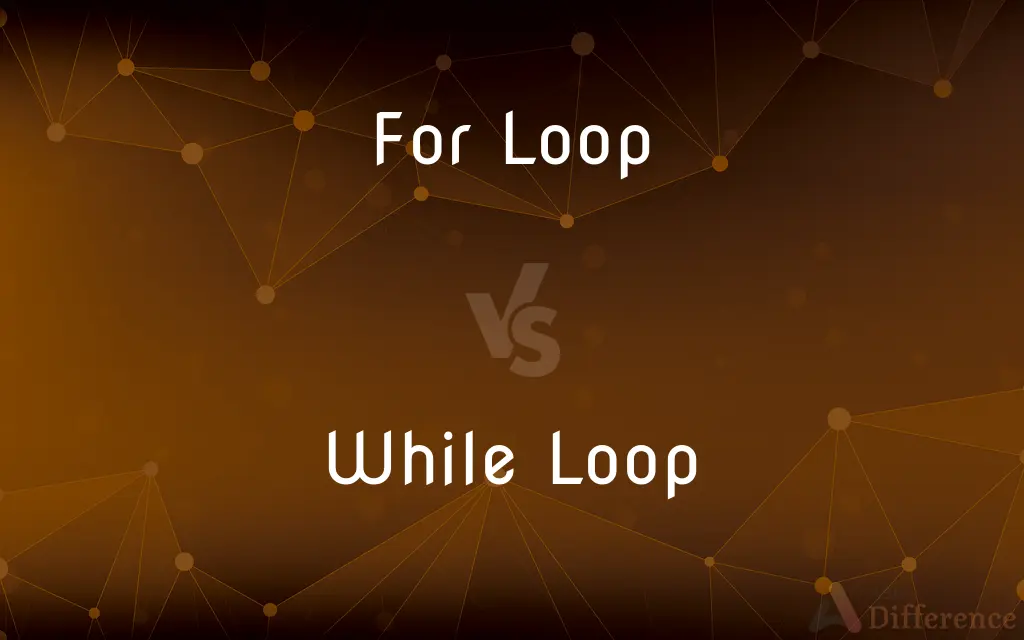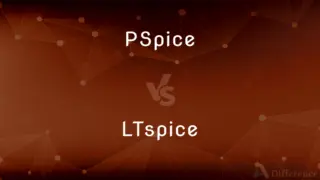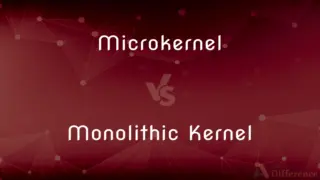For Loop vs. While Loop — What's the Difference?
By Tayyaba Rehman — Published on January 4, 2024
For Loop is a control structure that iterates a specific number of times; While Loop iterates based on a condition.

Difference Between For Loop and While Loop
Table of Contents
ADVERTISEMENT
Key Differences
In programming, For Loop and While Loop are both used to execute a block of code multiple times. The For Loop, however, is typically used when the number of iterations is known beforehand. On the other hand, the While Loop is used when the number of iterations is unknown and relies on a specific condition to terminate.
When using a For Loop, programmers define an iterator variable, its initial value, the condition that must be true for the next iteration, and the update of the iterator. In contrast, the While Loop only checks for a condition to continue or terminate the loop, making it more appropriate for situations where the loop's duration isn't predetermined.
A common scenario for a For Loop might be iterating through a list or array where the length is known. The While Loop, conversely, might be employed in situations where, for example, user input determines when to exit the loop.
In terms of syntax, For Loops often require more initial setup, such as defining the iterator and its behavior. While Loops, while simpler in structure, may need more careful design to ensure they don't become infinite loops if their conditions never change to false.
Lastly, choosing between a For Loop and a While Loop is often a matter of clarity and readability. If a loop's purpose is clearer with a For Loop, it's the preferred choice, even if a While Loop could also be used, and vice versa.
ADVERTISEMENT
Comparison Chart
Usage
When number of iterations is known
When loop duration is conditional
Initialization
Initializes a counter variable
Doesn’t require counter initialization
Condition Check
Before each iteration
Before each iteration
Termination
Based on counter reaching a specific value
Based on condition becoming false
Common Scenario
Iterating through arrays or lists
Repeatedly asking user input until valid
Compare with Definitions
For Loop
Defined with an initialization, termination condition, and iteration expression.
Use a For Loop to sum the elements of an array.
While Loop
A control structure that executes code as long as a condition is true.
A While Loop can keep running until the user presses 'exit'.
For Loop
Commonly used when the number of iterations is predetermined.
A For Loop can calculate factorial of a number.
While Loop
Can potentially create infinite loops if the condition never becomes false.
If not carefully checked, a While Loop might run endlessly consuming resources.
For Loop
A structured way to run a block of code a set number of times.
Use a For Loop to print numbers 1 to 10.
While Loop
Iterates based on a given Boolean condition.
A While Loop can read data until it reaches an end-of-file marker.
For Loop
A repetitive control structure with a defined start and end.
A For Loop can traverse through all characters in a string.
While Loop
Typically used when the number of iterations is not known beforehand.
Use a While Loop to keep asking for input until it's valid.
For Loop
Iterates based on an initialized variable, condition, and iterator update.
For each item in a list, a For Loop can execute a task.
While Loop
A repetitive control structure that checks a condition at its start.
A While Loop can decrement a number until it reaches zero.
Common Curiosities
What’s a potential risk with While Loops?
If not designed properly, While Loops can result in infinite loops.
Can I use a For Loop and While Loop interchangeably?
While they can sometimes be used interchangeably, choosing one over the other often improves code clarity.
What is a For Loop primarily used for?
A For Loop is used when you know the number of iterations in advance.
When should I use a While Loop?
Use a While Loop when the number of iterations is conditional or unknown.
How does a While Loop determine how long to run?
A While Loop runs as long as its specified condition remains true.
Can a For Loop operate without an iterator?
Typically, For Loops utilize an iterator, but the structure may vary based on the programming language.
Can I nest a For Loop inside a While Loop and vice versa?
Yes, loops can be nested within each other based on program requirements.
Can I skip an iteration in a For Loop?
Yes, using continue statements or similar constructs can skip to the next iteration.
How do I prevent an infinite loop in a While Loop?
Ensure the loop's condition will eventually become false during execution.
Are there scenarios where both For Loop and While Loop are inappropriate?
Yes, in cases where only one execution is required, a loop is unnecessary.
How is the iterator updated in a While Loop?
While Loop doesn’t implicitly update an iterator; any updates should be done manually within the loop.
Can I exit a For Loop prematurely?
Yes, using break statements or similar constructs allows for early loop termination.
Which loop is more efficient, For Loop or While Loop?
Efficiency often depends on the context and proper implementation, not the loop type itself.
Is it possible to use multiple conditions in a While Loop?
Yes, multiple conditions can be combined using logical operators.
Do For Loop and While Loop exist in all programming languages?
Most high-level programming languages support both, but the exact syntax and features might vary.
Share Your Discovery

Previous Comparison
PSpice vs. LTspice
Next Comparison
Microkernel vs. Monolithic KernelAuthor Spotlight
Written by
Tayyaba RehmanTayyaba Rehman is a distinguished writer, currently serving as a primary contributor to askdifference.com. As a researcher in semantics and etymology, Tayyaba's passion for the complexity of languages and their distinctions has found a perfect home on the platform. Tayyaba delves into the intricacies of language, distinguishing between commonly confused words and phrases, thereby providing clarity for readers worldwide.
















































